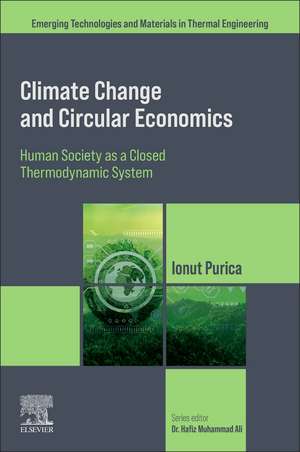Climate Change and Circular Economics: Human Society as a Closed Thermodynamic System: Emerging Technologies and Materials in Thermal Engineering
Autor Ionut Puricaen Limba Engleză Paperback – 24 iun 2024
Chapters progress from an analysis of present society as a dissipative open system to a thermodynamics view of the need for a circular economy, a big data analysis of climate change and risk mitigation, economic indicators, including entropy and economics, risk maps of climate change events risks, and insights into the ‘Gibbs paradox’, which describes the connection of two separate systems (like society and environment).
- Offers a unique, intersectional perspective on climate change
- Introduces generational risk maps for climate change events, opening the possibility for insurance as well as other mitigation and adaptation policies
- Provides methods to determine the contribution of selected economies to temperature increase and speed of increase using irreversible thermodynamics that allows for comparison with environmental recovery time constants
- Ends with a solution of the Gibbs ‘paradox’ that relies not on binary logic, but rather a multivalued modal logic of possibilities that sheds a profound light on the interaction of separate spaces versus their combination
Preț: 755.52 lei
Preț vechi: 990.33 lei
-24% Nou
Puncte Express: 1133
Preț estimativ în valută:
144.56€ • 150.95$ • 119.38£
144.56€ • 150.95$ • 119.38£
Carte tipărită la comandă
Livrare economică 08-22 aprilie
Preluare comenzi: 021 569.72.76
Specificații
ISBN-13: 9780443299698
ISBN-10: 0443299692
Pagini: 304
Dimensiuni: 152 x 229 mm
Greutate: 0.45 kg
Editura: ELSEVIER SCIENCE
Seria Emerging Technologies and Materials in Thermal Engineering
ISBN-10: 0443299692
Pagini: 304
Dimensiuni: 152 x 229 mm
Greutate: 0.45 kg
Editura: ELSEVIER SCIENCE
Seria Emerging Technologies and Materials in Thermal Engineering
Cuprins
1. Introduction
2. The present society as a dissipative open system
3. IrreversibleThermodynamics view of the need for a circular economy
4. Big data analysis to seek climate change proof and its risk mitigation
5. Brief considerations on economic indicators
6. Entropy in economics (bioeconomics, thermoeconomics, econophysics, etc.)
7. Gibbs ‘paradox’ in a modal multivalued logic of the experimenter
2. The present society as a dissipative open system
3. IrreversibleThermodynamics view of the need for a circular economy
4. Big data analysis to seek climate change proof and its risk mitigation
5. Brief considerations on economic indicators
6. Entropy in economics (bioeconomics, thermoeconomics, econophysics, etc.)
7. Gibbs ‘paradox’ in a modal multivalued logic of the experimenter



